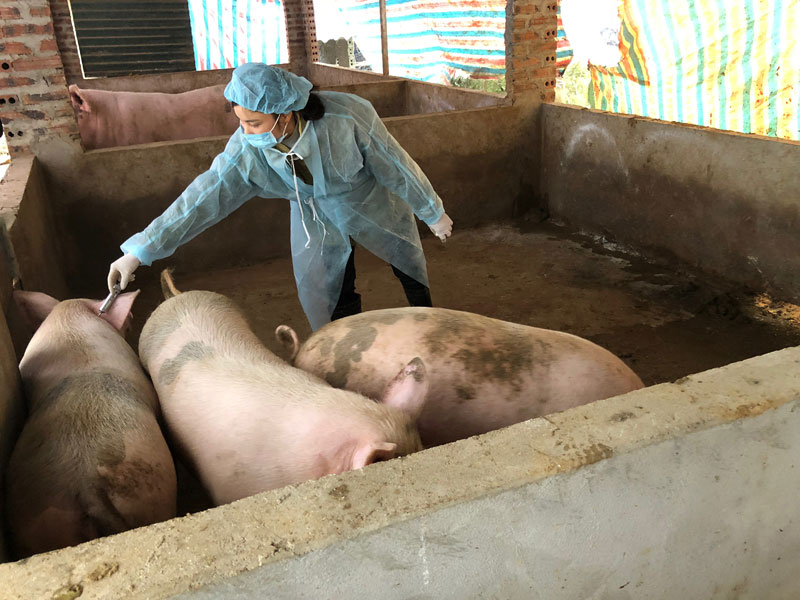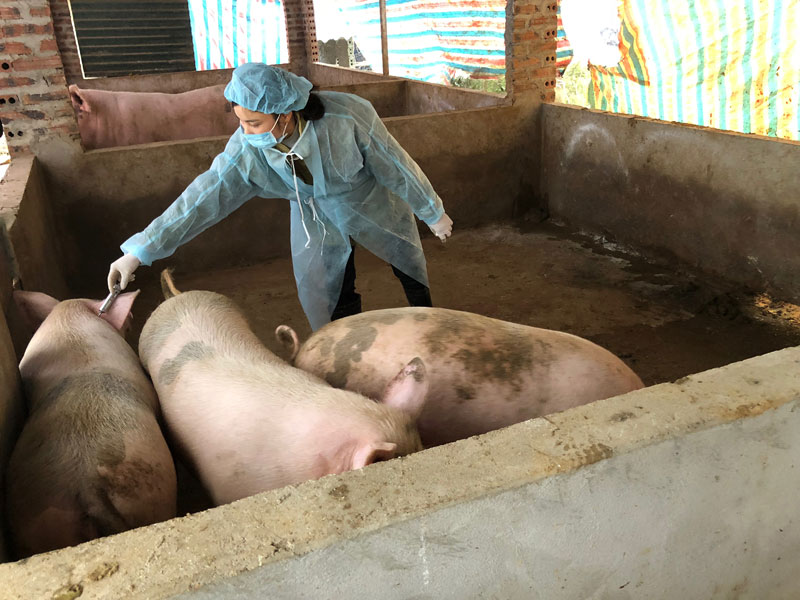
HBO – Hoa Binh province is doing its utmost to eliminate foot-and-mouth disease (FMD) on livestock. To date, the FMD epidemic has been going on for more than 1 month, appearing in seven out of 11 localities in the province including: Hoa Binh city, Luong Son, Kim Boi, Tan Lac, Lac Thuy, Lac Son and Yen Thuy districts. Disease outbreaks have great impacts on livestock production, food safety and public health in the province.

Veterinarians in Lien Vu commune (Lac
Son district) give shots of FMD vaccine to pigs in Chay village.
According
to a report of the local agriculture and rural development sector, besides the
4 localities that have yet to detect the disease, namely Ky Son, Cao Phong, Da
Bac and Mai Chau, there are three localities, namely Luong Son, Kim Boi and Hoa
Binh city, detecting no new outbreaks after 21 days. New outbreaks are reported
in four localities (Tan Lac, Yen Thuy, Lac Thuy and Lac Son) affecting nearly
3,000 pigs, of which 634 died. According to the animal husbandry and veterinary
medicine section, the main cause of FMD outbreaks in the localities is that
local farmers have not had their pigs vaccinated for a long time. The FMD
vaccination has only been carried out on cows and buffaloes through FMD control
programs on big cattle.
Another
reason is the mechanism of spreading outbreaks. FMD is classified into the
first group of diseases in the international quarantine list, as it causes a
high mortality rate in piglets, heifers and calves. For mature animals, they
can recover after about 2 weeks if being treated well, but the rapid spread of
the disease causes huge economic losses.
The
agriculture and rural development sector is working with localities where the
disease occurs to implement urgent measures to stop the disease, and prevent it
from spreading widely. Seven affected districts and city have allocated 2.1
billion VND from their standby budgets to buy 101,300 doses of vaccine for
epidemic prevention. The animal husbandry and veterinary medicine section regularly
checks and urges the implementation of measures to localise and stamp out FMD
outbreaks, while providing instructions along with tools and human resources to
affected areas to implement anti-epidemic works effectively.
Vuong
Dac Hung, Deputy Director of the provincial Department of Agriculture and Rural
Development, said that the province aims to stamp out all FMD outbreaks and
eliminate the disease by January 25.
The emulation movement "Hoa Binh joining hands to build new-style rural areas” has been widely spreading, becoming a driving force that motivates the localities to renew rural landscapes and improve the material and spiritual lives of the residents. In this movement, the people play a central role-both as the main implementers and direct beneficiaries of its outcomes.
In response to the global digital revolution, Hoa Binh Newspaper is transforming itself into a modern and multi-platform media hub, blending cutting-edge technology with a restructured newsroom and a new generation of tech-savvy journalists.
Hoa Binh province’s Association of the Elderly recently held a conference to review the project on expanding the inter-generation self-help club model until 2025.
In a move to implement Resolution No. 57-NQ/TW, issued on December 22, 2024 by the Politburo, which targets breakthroughs in science-technology development, innovation, and digital transformation, the Hoa Binh provincial Department of Health has issued a plan to roll out the "Digital Literacy for All” campaign within the local health sector.
An Nghia Commune (Lạc Sơn District) is one of the communes that achieved the tha standard of the national new rural area in 2018. Entering a new development phase, the commune is now trying to meet the criteria for the advanced new rural development. With the strong political will and the public consensus, the commune is gradually overcoming the challenges to reach this goal, aiming for the sustainable development.



